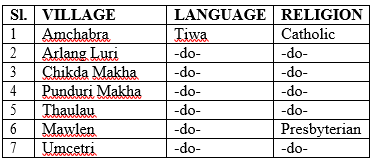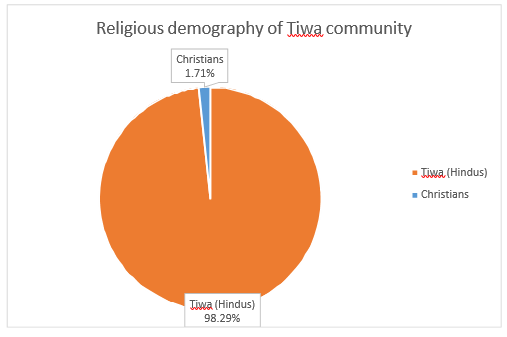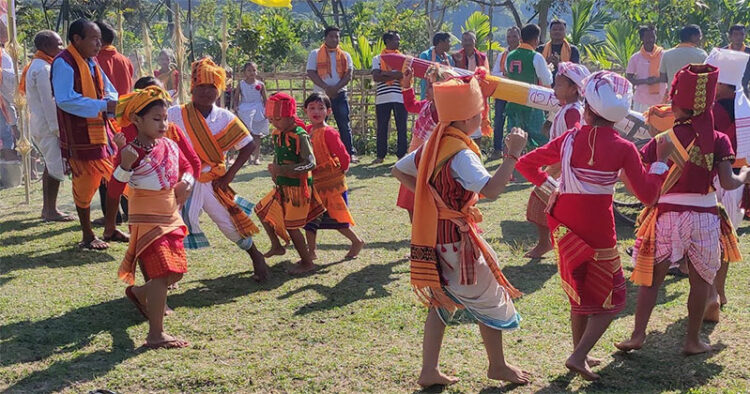The modern term culture is derived from the writings of Cicero, an ancient Roman orator, wherein he describes it as an agricultural metaphor for the development of a philosophical soul, understood as the highest possible ideal of human development. Culture is inextricably linked to people’s traditional knowledge, their experiences with the natural environment. Through culture, human beings become fully human, in true sense. Religion is one amongst the basic components of culture, especially those of Indigenous cultures, which shape multiple aspects of a society.
Today, civilisations across the globe are testament to the multidimensional impacts of religion, in diverse spheres of the human world ranging from institutions of polity to economics since its inception, over a few unknown millennia. Every human being is identified with some set of religious-cultural attributes that are synonymous with the society she is born into, and these can be referred to as the prerequisites for her identity amidst other societies. It would not be an exaggeration to say that without all those cultural and religious elements that a person is recognised with, she would rather be devoid of her identity.
Tiwa, also referred to as the Lalungs in the Assamese Buranjis and in colonial literatures, is a Janajati community belonging to the Bodo Kachari section of ethnic groups of North East Bharat. Most of them are inhabitants of the Districts of Morigaon, nagaon, Kamrup (M), West karbi Anglong of Assam and Ri-Bhoi of Meghalaya. The Tiwas, marked by their vibrant festivals with joyous dances and lively music and also the peculiar system of divisions into clans and sub-clans amounting as much as to 61, were recognised as Scheduled Tribes through the First Constitution Order (1950) in the State of Assam excluding the Autonomous Districts of Karbi Anglong and North Cachar Hills.
Later in 2002 the Tiwas living in those autonomous districts were also given Scheduled Tribe Status. Another notable characteristic of Tiwa society is that women are worshiped as deities and are allowed to perform religious rites on many occasions.
Christianity in Tiwa society
American Baptist missionaries had made attempts to spread their conversion activities from 1859 onwards in Karbi Anglong district with poor results up until the 1920s. In 1914, a group of six Karbis led by Mr. Lantuk Hanse, from Marjong, close to the present parish of Umswai, trekked across to Umtyrkhang in Khasi Hills beyond the river Umiam, to be baptised by Christopher Becker. Thus the first Catholic Christians of Umswai and of Karbi Anglong was born.
The year 1916 had seen the establishment of Saint Mary’s Church in Marjong Tiwa village of present-day West Karbi Anglong District of Assam. Saint Joseph Church was established in 1932 which converted peoples of Pandurimakha, Sikdamakha and Amsobra villages of the hill district. The Catholic Celestial Missionary also converted a large number of Tiwa people to Christianity.
The Presbyterian Missionary also followed suit and converted Tiwa villagers of Romphom, Maulen, Amsetri, Pantalu, Roman Mayong and Amkhashi into Christianity. In Meghalaya, a large number of the Tiwa population is reported to have accepted Christianity abandoning the religious and cultural practices passed on to them by their ancestors.
By the mid nineteenth century, Umswai valley’s population was concentrated into two large villages, namely: Bormarjong and Amsai. Now the valley hosts 15 distinct settlements, of which seven are Tiwa Speaking villages with Christianity in different denominations.
Languages and religious denominations in villages of Umswai valley

Setting up of the Catholic mission in the valley in 1975 saw a rising number of push and pull factors for demographic movements. The Missionaries started to offer free schooling and health care to villagers which were interestingly not reserved for Christian villages, thereby convincing many non-Christians that converting and living in Christian villages could open the floodgates to more benefits.
As Christian villages had been set up, those who refused to convert to Christianity were expelled from such villages. The principle of total separation, through which only one religious affiliation is tolerated in a locality, was in fact a prime contributor to the soaring number of religious conversions.
Michael Balawan published the first book in Tiwa language, that too a Christian hymnal and prayer book titled “Mindei Khrum” in 1962. His also translated the New Testament into Tiwa with the title Khorong Kodal (1972) with an aim to sustain and spread Christian faith.

Implications:
These slow but steady rates of conversion into Christianity brought about inevitable implications in Tiwa societies across the state. Gradual loss of Chamadi (Village youth dormitory) in Tiwa villages dominated by Christians is one such instance. Vibrant festive occasions rich with traditions and heritage are also being discarded by the Christians. Of all these, the most unfortunate is the internal division stemming up among the Tiwas due to conversions resulting in the replacement of the ethnic tradition and culture with a “modern”, western one. After accepting Christianity, there were huge loss of faith in folk culture and traditions too.
The Tiwa community, like any other indigenous community in the country, has their own sets of belief systems, customary laws, justice delivery system and various other political institutions threaded intrinsically with their ancient traditional beliefs and customs. The traditional judiciary system of the Tiwas owes its origins to their kings/chiefs, with customary law prevalent in the socio-religious sphere.
There are three tier systems of justice, i.e., Khel (lowest level), Village level and Baro Khelia Bichar system, a powerful system of justice delivery. If all three levels fail to settle dispute, the matter is brought before the king whose decision is considered final. There is also a provision of Jury system, wherein Tiwa judiciary system consists of three members to decide a dispute. Some of the important features of the customary law are, viz., no corporal punishment and no death penalty and different types of penalty imposed in accordance with the gravity of the offence.
The onslaught of aggressive missionary activities prominently conversion by means of threat, allurement and social exclusion sees a rapid annihilation of all those sets of values and beliefs sacred to the Tiwas, thereby causing immeasurable damage not only to the social fabric of the nation, but also the holistic eco-social world view of such indigenous communities, a phenomenon observed across globe.
Way out
One of the most important issues arising out of the crisis of conversion is about reservation and other benefits provided to Scheduled Tribes by the constitution of India. Needless to say that in India, Christians as well as Muslims enjoy reservation and various other benefits given under minority quota of the Govt. But there are no provisions made in the Constitution of India to identify converted Christians who also hold Scheduled tribe certificates. This leads to the exploitation of opportunities meant for helpless, downtrodden Janajati peoples by Converted STs because now they technically belong not only to the ST category, but also that of the Minority. With such loopholes in the system damaging the sacred tenets of the nation which hold us all together, it is important for us Bharatiyas to try to find a way out of these challenging situations.
Delisting
Delisting, which refers to abrogation of Scheduled Tribe status of converted Christians who previously were STs, will be a historic and holistic approach towards resolving the crisis afflicting Janajati societies such as Tiwa, for as much as five long decades. Mananiya Late Kartik Oraon, who was a Member of the Loksabha, stood affirm and raised his voice against this injustice. It is because of his undaunted efforts, a Joint parliamentary Committee (JPC) on Scheduled Castes and Scheduled Tribes was formed in 1967 which recommended the following amendments:
“2A. Notwithstanding anything contained in Paragraph 2, no person who has given up tribal faith or and has embraced either Christianity or Islam shall be deemed to be a member of any Scheduled Tribes (Vide Para 2A, page 29, line 38 of the Schedule II of the report).
Significantly, similar amendment in the constitution had already been provided for scheduled castes through Constitution (Scheduled Castes) Order, 1950 and Scheduled Castes and Scheduled Tribes Orders (Amendment) Bill, 1956. The amendments are:
“3. Notwithstanding anything contained in the Paragraph 2, no person who professes a religion different from the Hindu or Sikh Religion shall be deemed to be a member of Scheduled Castes”
Besides, Late Kartik Oraon also put his best efforts in trying to bring this issue to the attention of the then regime including the then Prime Minister Smt. Indira Gandhi, to whom he wrote a few letters regarding this and submitted memoranda too. Unfortunately, his selfless efforts and hard work stood overlooked for reasons best known to the then Govt. Therefore, the Janajati Suraksha Manch took on this challenging task that remained unaccomplished, on its broad shoulders, and has been organising various events and initiatives across the country raising awareness amongst masses.
It is important to mention here that there are few essential characteristics referred to in the Constitution for specification of the Scheduled Tribes:
1) Primitive Traits 2) Geographical isolation 3) Distinct culture 4) Shy of contact with community at large 5) economically underdeveloped, etc.
Few Important Supreme Court judgements:
After Change of faith, whether a person ceases to be a member of Scheduled tribe or not, it has to be established that a person who has embraced another religion is still suffering from social disability and is also following the customs, tradition and rituals of the community which he earlier belonged to. (State of Kerala vs Chandramohanan, AIR 2004 SC 1672)
A Converted Christian (tribal) cannot contest in election for the post of a Dolloi (Traditional village headman) as he cannot perform religious and administrative work at a time which the Dolloi has to do as per customs. (Ewanlankei Rymbei vs jayantia Hills District Council and Others, 2006 Scale 3).
In view of all these findings, it appears therefore, that the onus is on the lawmakers of the nation to undo the historical mistake, by taking effective measures for implementation of Delisting at the earliest through means best suited to the law and justice mechanisms of the nation, thereby allowing all the deserving members of STs to be benefitted from privileges such as reservations, providing them with the opportunity to live their lives with dignity as envisaged in the Constitution of India, i.e., Bharat. And this, as we believe, would lead to accomplishment of the mantra Ek Bharat Shreshtha Bharat propounded by our Prime Minister.




















Comments